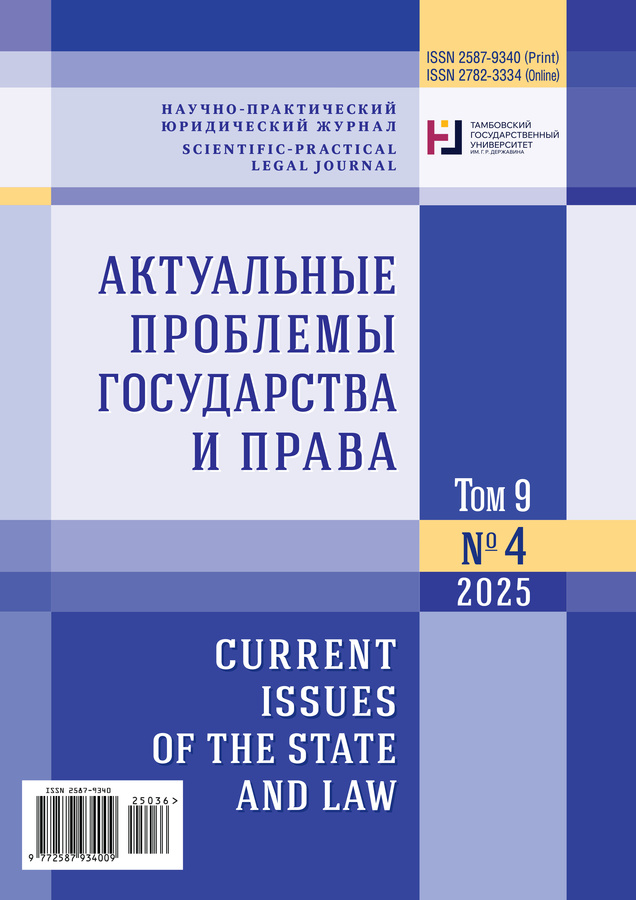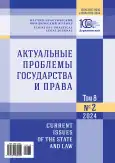Корреляция уголовно-правовой политики в контексте эффективной реализации уголовной ответственности
- Авторы: ДВОРЕЦКИЙ М.Ю.1
-
Учреждения:
- Тамбовский филиал ФГБОУ ВО «Российская академия народного хозяйства и государственной службы при Президенте Российской Федерации»
- Выпуск: Том 8, № 2 (2024)
- Страницы: 257-269
- Раздел: Материальное право
- URL: https://journal-vniispk.ru/2587-9340/article/view/303224
- ID: 303224
Цитировать
Аннотация
Цель – установление системообразующих критериев, предпринятых отечественным законодателем изменений и дополнений главы 33 УК РФ на современном этапе развития национальной правовой системы и оптимальных корреляций в дальнейшем для наиболее эффективного предупреждения данного вида преступности и рассматриваемых составов преступлений. Актуальностью выступает необходимость определения наиболее перспективных направлений реформирования отечественного уголовного законодательства, целенаправленных на эффективную охрану общественных отношений, взаимосвязанных военной службой, и оптимального предупреждения преступности военнослужащих. Научной новизной и практической значимостью выступает обоснование необходимости продолжения изменения и дополнения системы составов преступлений, предусмотренных главой 33 УК РФ, их дальнейшей корреляции отечественным законодателем для правильной квалификации содеянного виновного и назначения справедливого наказания осужденному, а также эффективного предупреждения данного вида преступности. В настоящее время остаются открытыми, спорными вопросы привлечения к уголовной ответственности лиц, проходящих военную службу в различных государственных структурах. Анализ проведен на основе современной судебной практики Российской Федерации. Проанализированы официальные статистические данные о современном состоянии преступности в России, положения нормативных актов, внесших изменения и дополнения в Уголовный кодекс Российской Федерации, связанные с проведением специальной военной операции. Сделаны обоснованные выводы и внесены аргументированные предложения отечественному законодателю по дальнейшему совершенствованию Уголовного кодекса Российской Федерации и рекомендации правоприменителям по правильной квалификации содеянного виновным, назначении справедливого наказания и эффективному предупреждению преступности в контексте эффективной реализации уголовной ответственности за рассматриваемые составы преступлений.
Об авторах
Михаил Юрьевич ДВОРЕЦКИЙ
Тамбовский филиал ФГБОУ ВО «Российская академия народного хозяйства и государственной службы при Президенте Российской Федерации»
Автор, ответственный за переписку.
Email: dvoretskiy-68@mail.ru
ORCID iD: 0000-0002-6435-1526
кандидат юридических наук, доцент, доцент кафедры правовых дисциплин
Россия, Российская Федерация, 392028, г. Тамбов, ул. Бастионная, 16Список литературы
- Агапов П.В., Закомолдин Р.В., Меркурьев В.В. Об уголовной ответственности за уклонение от призыва на военную службу в порядке мобилизации // Военно-юридический журнал. 2023. № 1. С. 5-8. https://doi.org/10.18572/2070-2108-2023-1-5-8, https://elibrary.ru/aleebi
- Агаркова Н.В. Обстоятельства, генерирующие преступность военнослужащих // Правопорядок: история, теория, практика. 2014. № 2 (3). С. 113-116. https://elibrary.ru/sznpsz
- Агешин А.А. О некоторых особенностях криминалистической характеристики добровольной сдачи в плен военнослужащих // Вестник военного права. 2022. № 3. С. 43-47. https://elibrary.ru/lpgyqj
- Бодаевский В.П., Гутник О.В. Специальные субъекты преступлений против военной службы в уголовном законе Российской Федерации // Государство и право. 2015. № 2. С. 115-119. https://elibrary.ru/tmgfwf
- Борисенко В.М. и др. Преступления против военной службы. СПб.: Юр. центр Пресс, 2002. 399 с.
- Бражник Ф.С. Актуальные проблемы совершенствования и применения к военнослужащим норм Общей части уголовного законодательства Российской Федерации: дис. … д-ра юрид. наук в форме научн. доклада, выполняющего также функции автореф. М.: Воен. ун-т, 1995. 38 с.
- Ахметшин Х.М., Бражник Ф.С., Зателепин О.К., Петухов Н.А. и др. Военно-уголовное законодательство Российской Федерации. Научно-практический комментарий / под общ. ред. Н.А. Петухова. М.: За права военнослужащих, 2004. 304 c.
- Винокуров А.Ю. О необходимости дальнейшего совершенствования военно-уголовного законодательства Российской Федерации в условиях проведения специальной военной операции // Вестник военного права. 2023. № 1. С. 12-16. https://elibrary.ru/ctvjsj
- Власенко В.В. Добровольная сдача в плен (ст. 352.1 УК РФ): вопросы уголовной ответственности и освобождения от нее // Уголовное право. 2023. № 3 (151). С. 38-45. https://doi.org/10.52390/20715870_2023_3_38, https://elibrary.ru/elllyb
- Ермолович Я.Н. Дифференциация уголовной ответственности военнослужащих. М.: Изд-во «Юрлитинформ», 2014. 288 с.
- Зателепин О.К. Понятие преступления против военной службы (комментарий к ст. 331 УК РФ). (Вкладка «Военно-уголовное право») // Право в вооруженных силах – военно-правовое обозрение. 2002. № 4. С. 1-6.
- Зателепин О.К. Уголовно-правовое обеспечение военной безопасности Российской Федерации (вопросы теории, законодательства и практики). М.: За права военнослужащих, 2013. 192 с.
- Землянко О.А., Мельникова Ю.И. Проблемные аспекты квалификации деяний по статье о добровольной сдаче в плен // Вопросы российской юстиции. 2022. № 21. С. 457-464. https://elibrary.ru/lguitx
- Кудашкин А.В., Фатеев К.В. Закон Российской Федерации «О статусе военнослужащих» (постатейный научно-практический комментарий). (Продолжение) // Право в вооруженных силах – военно-правовое обозрение. 1998. № 2. С. 4-9. https://elibrary.ru/biicxw
- Лопатин М.Ю. Неосторожная преступность военнослужащих: автореф. дис. ... канд. юрид. наук. М., 2012. 32 с. https://elibrary.ru/qigzsl
- Маликов Д.С. Использование понятийного аппарата и норм международного гуманитарного права при квалификации военных преступлений // Международное уголовное право и международная юстиция. 2013. № 5. С. 5-9. https://elibrary.ru/rcdxlx
- Мацкевич И.М. Преступность военнослужащих: криминологические и социально-правовые проблемы: автореф. дис. … канд. юрид. наук. М., 2000. 40 с. https://elibrary.ru/ogfncz
- Михеенко С.В. Уголовная ответственность за самовольное оставление части или места службы: автореф. дис. ... канд. юрид. наук. М., 2009. 23 с. https://elibrary.ru/nladgv
- Моргуленко Е.А. К вопросу об уголовной ответственности лиц, участвующих в специальной военной операции на добровольной основе // Военное право. 2023. № 3 (79). С. 195-198. https://elibrary.ru/esrlhw
- Мялицына М.А. Уклонение от призыва на военную службу по мобилизации: ответственность есть, а нормы нет // Вопросы российской юстиции. 2022. № 21. С. 482-488. https://elibrary.ru/qwogaf
- Оноколов Ю.П. О преступности военнослужащих в военное время и в боевой обстановке // Военно-юридический журнал. 2011. № 9. С. 2-5. https://elibrary.ru/oipuod
- Оноколов Ю.П. Возникновение и развитие военно-уголовного законодательства в России до образования российской империи // Военно-юридический журнал. 2015. № 10. С. 18-21. https://elibrary.ru/uizfwj
- Панин А. Юридическая ответственность военнослужащих за невыполнение общих и специальных обязанностей // Военно-юридический журнал. 2009. № 5. С. 2-14. https://elibrary.ru/kdnnrd
- Плешаков А.М., Шкабин Г.С. Классификация мародерства и его отграничение от иных преступлений // Вестник Волгоградской академии МВД России. 2023. № 1 (64). С. 39-44. https://doi.org/10.25724/VAMVD.A073, https://elibrary.ru/mignyu
- Решняк М.Г. К вопросу о совершенствовании уголовного законодательства об ответственности за преступления против военной службы // Современное право. 2023. № 2. С. 78-82. https://doi.org/10.25799/NI.2023.39.57.015, https://elibrary.ru/oljofh
- Теуважев З.А., Корженко В.С. Проблемные аспекты правоприменительной практики по статье 352.1 Уголовного кодекса Российской Федерации «Добровольная сдача в плен» // Право и управление. 2023. № 2. С. 255-257. https://doi.org/10.24412/2224-9133-2023-2-255-257, https://elibrary.ru/sguwgq
- Титов А.В. Юридическая ответственность за неисполнение общих обязанностей военнослужащих Вооруженных Сил РФ: Проблемы юридической ответственности военнослужащих и военных организаций // Российский военно-правовой сборник № 12: Проблемы юридической ответственности военнослужащих и военных организаций. М.: За права военнослужащих, 2009. Вып. 97. С. 166-170.
- Торкунов М.А. Закрытость сведений о преступности в Вооруженных Силах Российской Федерации не способствует укреплению дисциплины и правопорядка в войсках // // Право в вооруженных силах – военно-правовое обозрение. 2006. № 11 (113). С. 57-60.
- Шарапов С.Н. Военно-уголовное право в системе отечественного права // Военно-уголовное право. 2007. № 3. С. 113-121.
- Шарапов С.Н. Военно-уголовное законодательство: новая дефиниция старого термина // Военное право. 2009. № 1. С. 51-57. https://elibrary.ru/jyanbr
- Шулепов Н.А. Правовые основания и формы реализации уголовной ответственности военнослужащих в Российской Федерации. М., 2001. 198 с. https://elibrary.ru/rdooit
- Шулепов Н.А. Теоретические основы реализации уголовной ответственности военнослужащих: дис. ... д-ра юрид. наук. М., 2001. 365 с. https://elibrary.ru/nlxczz
- Фатеев К.В. Об особенностях юридического поведения должностных лиц органов военного управления, связанного с пребыванием на военной службе военнослужащих, проходящих военную службу по контракту, в отношении которых возбуждены уголовные дела // Право в вооруженных силах – военно-правовое обозрение. 2009. № 12 (150). С. 20-24.
Дополнительные файлы









